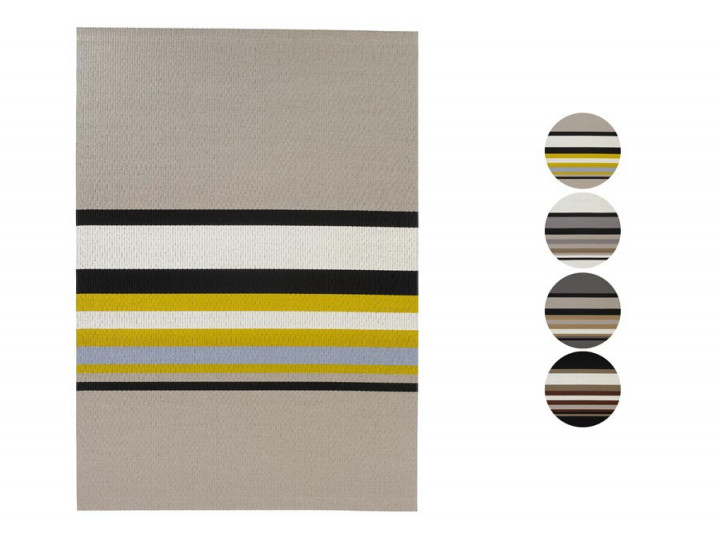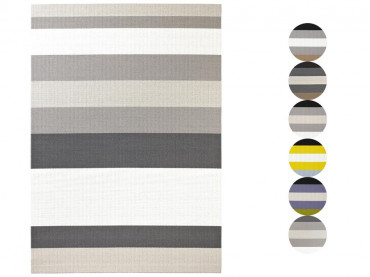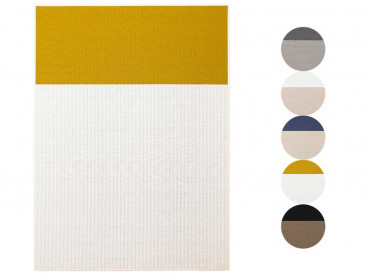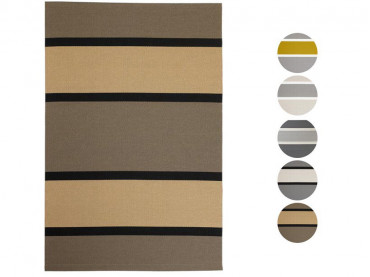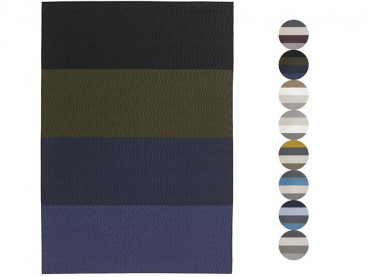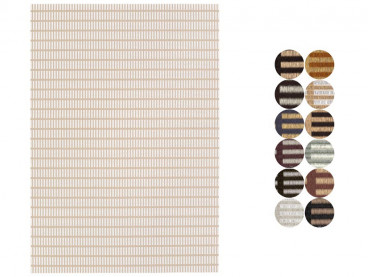Mid-Century modern scandinavian rug Horizon by Ritva Puotila. Custom size. 4 colours
-
Ritva Puotila
-
Woodnotes
- WN006 Delivery time : 10 to 12 weeks.
(€ 260.00 / m2)
Mid-Century modern scandinavian rug Horizon by Ritva Puotila. Custom size. 4 colours.
The multi-colored stripes of the Horizon carpet are placed on the unicolored base assymmetrically in respect to the length of the carpet. The width of the stripy area is determined by the length of the carpet, but is always at least 90 cm.
Woodnotes is a Finnish design company created by textile designer Ritva Puotila.
Woodnotes are woven with braided paper, identical to the rope used for Danish chairs.
The wire of paper is EXTREMELY RESISTANT to the deformation and to the time, thanks to the properties of the wood fiber of which it is composed. Its density prevents dust and dirt from settling. It is ANTI-ALLERGEN AND ANTI-ACARIAN.
Woodnotes have been given an anti-stain treatment that prevents the penetration of liquids. They are very EASY TO MAINTENANCE. Suitable for housing and public places.
Woodnotes have received numerous awards, including the Good Design Award (Japan), Interior Innovation Award IMM (Germany), Design and Decoration Award (Great Britain). They are included in the collection of design and architecture at the Museum of Modern Art (MOMA) in New York.
All samples are visible at our showroom.
Options in extra (please consult us): edging, non-skid backing.
Price indicated for 1 m2 in 140x220cm. The price of m2 is decreasing according to the size. (ask us for a precise quotation).
| Condition | New product, on demand |
| Dimensions | Custom size. Size maxi : 2,5 x 5 m. Thickness : 6 mm. Weight : 1,9 kg/m2 |
| Material | 86% paper yarn (welft) and 14% cotton (chain). Finish: Swen edges and turned ends. hand-sewn. |
| Style | Contemporain Neuf |
| Origin | Sweden |
| Fournisseur | Woodnotes |
Ritva Puotila
Ritva Puotila, artistic director of Woodnotes, founded Woodnotes with her son Mikko Puotila in 1987, basing the company on the concept of paper yarn. Puotila says that paper has properties that differ fundamentally from the other fibres she use: its lightness and rustling, its clean natural colour when unbleached, its whiteness and the glow of colour. Ritva Puotila has raised the status of this traditional Finnish material to a new level, that of designer textile. From the start, the Woodnotes collection consisted of a broad range of interior textiles, from carpets and blinds to upholstery and small objects for the home. Woodnotes’ foray into this new field was rewarded immediately during its founding year with the French Oscar Prize, continuing with further recognition in subsequent years.
Woodnotes’ new pile rugs have their roots in the traditional Finnish ryijy, a rug-like tapestry. During her student years, Puotila worked with stained glass, and she brought its spirit to the first ryijy patterns she designed for competitions organised by the Friends of Finnish Handicraft. The results were winning: Puotila’s ryijys won the gold medal at the Milano XII Trienniale in 1960 and other prizes.
Puotila’s cooperation with the Friends of Finnish Handicraft continued until the 2000s. The success of the rugs steered the direction of her artistic energies from set decoration to textile design. She founded her own studio and built an international career designing for companies in the Nordic countries, USA, and the Far East. Puotila’s relationship with the company Tampella was a long-term one; her early experimentation there with paper as well as linen and cotton planted the seeds of interest in paper as a material for textiles.
The traditional ryijy from Finnish farmhouses remains dear to Puotila. “For me, the basic premise of the ryijy is a practical textile: its function is to warm,” she reflects. The same idea continues to live on in Woodnotes’ new wool-linen pile carpets. The hand-tufting offers the opportunity for vibrant use of threads and colours. “A footprint leaves an impression in the carpet’s surface, just like in the sand,” she enthuses.
Names referring to nature are characteristic of Puotila’s unique textiles, while the names of collection products are clearly more urban. The artist says that she names a new product at an early stage, and the name shapes the development of the product’s character.
In addition to winning awards for her products, Puotila has received lifetime achievement awards, including the Finland Prize and the Kaj Franck Design Prize. Her works are included in the collections of the world’s most prestigious museums, including the Architecture and Design Collection at MOMA.

